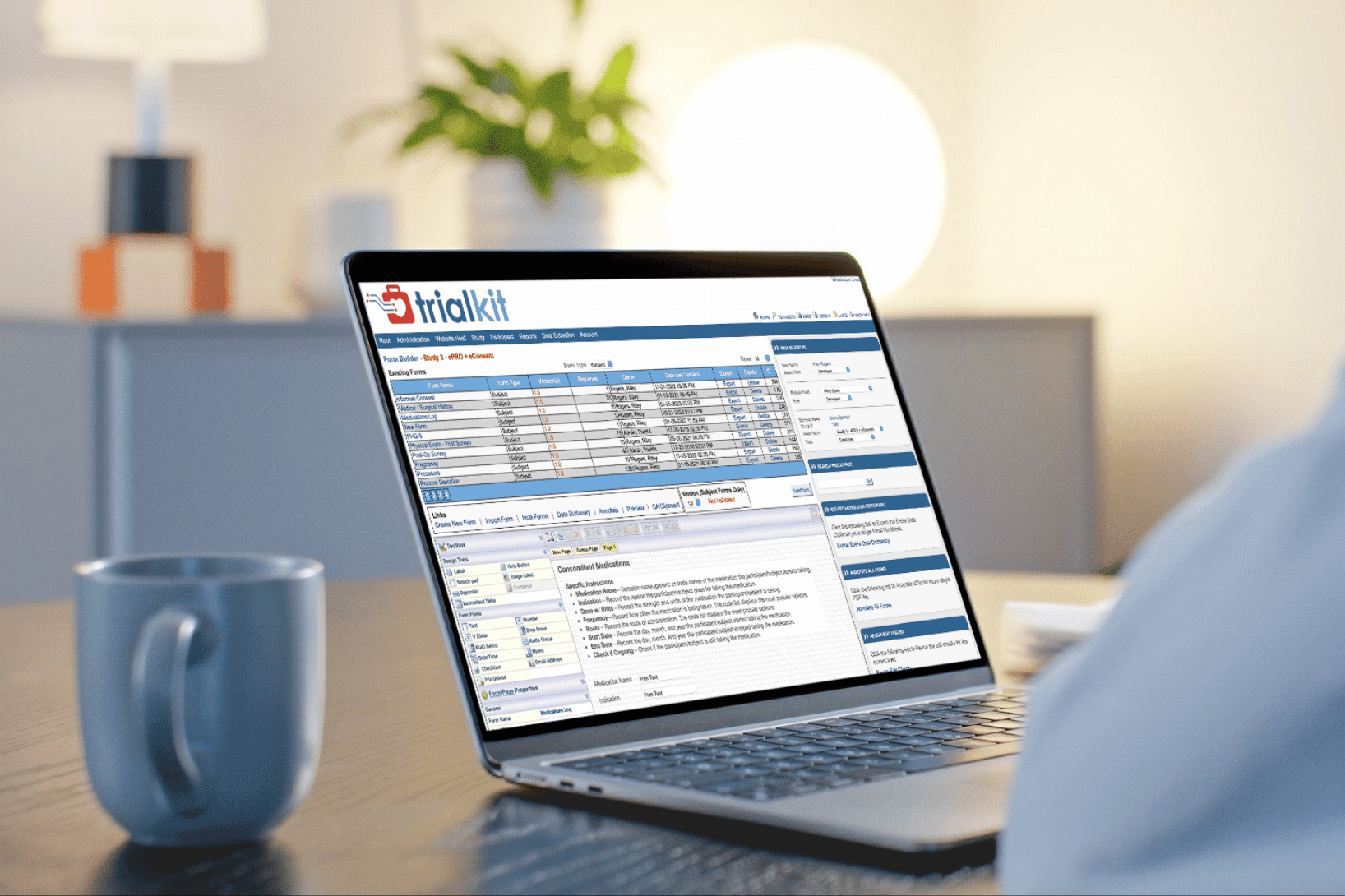Adaptive clinical trials are built to respond to evidence as it emerges, allowing researchers to make changes midstream without compromising study integrity. Adjustments to dosing, enrollment, or treatment arms can be made based on interim analyses, creating opportunities for faster timelines, better resource allocation, and improved patient safety. This promise depends on one critical factor: the ability to capture and interpret data in real time.
Electronic data capture (EDC) platforms provide the foundation for this responsiveness. A system like TrialKit from Crucial Data Solutions delivers real-time data entry, flexible study builds, and automated oversight tools that turn adaptive trials into an operational reality. Rather than serving as a static repository, TrialKit acts as a live environment where data informs decisions the moment it is collected.
Adaptive Trials Demand More Than Traditional Tools
Adaptive trial designs differ from conventional approaches by requiring more frequent decision points, often tied to interim analyses. At these points, researchers may decide to expand a cohort, adjust a dose, or discontinue a study arm. The success of the design depends on having timely and trustworthy data. When information is delayed or incomplete, the entire model loses its value, as decisions must be made quickly to be meaningful.
Traditional systems often fall short of this challenge. Reports may take days to generate, data entry can be inconsistent, and integrating changes into ongoing studies can create long disruptions. For adaptive studies, these shortcomings are more than inconveniences—they are risks that undermine both safety and scientific validity. EDC platforms designed for adaptive use recognize that change is a constant, not an exception. They provide the speed, flexibility, and visibility needed to make each decision point reliable, giving sponsors confidence that their trial can evolve while maintaining rigor.
The Foundation of Real-Time Decision-Making: EDC as a Live Data Hub
At the core of adaptive trial success is an EDC that functions as a live hub of intelligence. Every data point, whether captured at a clinical site, entered remotely by a participant, or imported from a lab, must flow directly into the system without delay. Real-time entry ensures that information is always current, while interoperability allows data from external systems such as wearables, EHRs, and imaging platforms to be consolidated. The EDC becomes the single source of truth across all trial operations.
TrialKit exemplifies this model with its cloud-based architecture and mobile-enabled data capture. Investigators can input information at the point of care, while participants submit ePRO from their own devices. Sponsor teams then monitor the evolving trial through unified dashboards, seeing trends as they emerge rather than waiting for periodic reconciliations. This hub approach allows trial leaders to adapt with confidence, knowing that decisions are based on the full, current picture of the study.
Supporting Frequent Interim Analyses With Clean, Current Data
Interim analyses drive adaptive trial decisions, but they are only as reliable as the data sets they examine. Clean, validated, and current data is required to determine whether a treatment arm continues, whether a dose adjustment is justified, or whether the study should pause for safety concerns. If interim looks are based on incomplete or outdated information, the entire trial risks moving in the wrong direction.
This challenge can be addressed with workflows for controlled data locking and unlocking. This capability allows sponsors and statisticians to review validated data sets for interim analyses while the study remains open for ongoing entry. Every interaction with the data is tracked through audit trails, ensuring compliance and transparency. Role-based permissions further safeguard access, so each stakeholder sees only what they are authorized to review. By enabling fast yet controlled access to interim data, TrialKit makes it possible to conduct frequent analyses without slowing the trial or compromising integrity.
Automating Alerts and Threshold Triggers
Adaptive protocols often specify prescheduled events that require immediate review. These can include safety signals, enrollment milestones, or laboratory values that fall outside expected ranges. Monitoring manually for these events is inefficient and introduces the risk of missing critical thresholds.
TrialKit enables continuous monitoring of trial data through configurable rules that generate alerts the moment conditions are met. Examples include:
- Notifications when enrollment reaches a set number in a given cohort.
- Alerts when adverse events surpass predefined safety levels.
- Triggers when lab values or vitals cross critical boundaries.
By surfacing these events instantly, TrialKit ensures that adaptive actions such as cohort expansion, dose changes, or temporary study pauses can occur at the right time. Automated alerts remove delays, improve oversight, and keep trials aligned with both safety requirements and scientific goals.
Enhancing Data Monitoring With DSMB and Stakeholder Dashboards
Data Safety Monitoring Boards (DSMBs) and other oversight groups are critical in adaptive designs, as their recommendations often drive mid-trial changes. For these groups, timely access to accurate data is essential. They must review interim results with precision, and depending on governance rules, they may require blinded or unblinded views of the data.
This oversight can be supported with dashboards and reports designed for flexibility and security. DSMBs can access curated snapshots of subject status, site performance, and safety signals, filtered to show exactly what is needed for decision-making. Real-time updates ensure that committees are reviewing the latest data, not outdated extracts. Secure, role-based access protects sensitive information, while audit logs preserve a complete record of every interaction. Beyond standard reports (e.g., form data, query aging, subject visits, site payments, etc.), TrialKit AI allows teams to query virtually any data across the platform. For adaptive designs, this flexible analytics capability is particularly valuable when stakeholders need custom insights during interim reviews.
Speeding Query Resolution and Minimizing Downtime
Queries are inevitable in clinical research, but in adaptive trials they carry greater weight. An unresolved query may prevent a data set from being included in an interim analysis, delaying decisions that drive the study forward. Rapid resolution of queries is therefore essential to the success of adaptive designs. TrialKit incorporates query workflows directly into the platform to streamline communication between sites, monitors, and data managers. Response times are improved by features such as:
- Mobile notifications that alert investigators immediately when new queries are issued.
- Priority tagging of variables tied to upcoming analyses to ensure fast attention.
These capabilities shorten the feedback loop between those generating queries and those resolving them. The result is cleaner data sets available at the moments when they are most needed. By reducing downtime associated with data clarification, TrialKit helps sponsors maintain momentum in adaptive trials and ensures that decisions rest on the most accurate information possible.
EDC as a Strategic Enabler, Not Just a Storage System
The role of EDC in adaptive trials extends beyond capturing data points. It acts as the orchestrator of change, enabling studies to adapt without creating disruption. When a protocol amendment is approved, new forms, arms, or eligibility rules must be introduced quickly and cleanly. Without a flexible platform, these changes can create parallel builds or force time-consuming rework that compromises the study’s flow.
Form versioning, branching logic, and configurable workflows that support updates mid-study are extremely useful in these cases. These capabilities allow trial leaders to introduce changes in real time, ensuring that data continuity is preserved and oversight remains intact. By making adaptation seamless, the EDC becomes a strategic enabler of the study model itself. TrialKit provides the infrastructure that allows adaptive trials to function as intended: agile, responsive, and scientifically rigorous.
Powering Agility and Precision in Adaptive Trial Designs
Adaptive trials thrive on agility, but they cannot sacrifice precision. Real-time data capture, automated monitoring, rapid query resolution, and flexible study design provide both. When combined in a single platform, these features allow sponsors to act quickly without compromising safety, compliance, or data integrity.
A modern EDC should work to combine all of this in a unified environment that connects participants, sites, sponsors, and oversight committees with a common view of study progress. The result is faster insights, more confident decision-making, and better trial outcomes. For trial designers and medical directors, adopting an adaptive-ready EDC is no longer optional. It is the foundation for conducting studies that are both innovative and reliable.
FAQs About EDC in Adaptive Trials
What makes adaptive trials different from traditional trials?
Adaptive trials allow mid-study modifications to the protocol based on data collected during the trial. Traditional designs follow a fixed plan, while adaptive designs may adjust treatment arms, enrollment, or dosing in response to interim results.
How does EDC enable faster interim analyses in adaptive trials?
EDC platforms support faster analyses by providing immediate access to validated data. Dynamic data locking and unlocking, automated edit checks, and real-time dashboards allow sponsors and statisticians to review data sets without delay.
What types of alerts can be built into an EDC system?
EDC systems like TrialKit can issue alerts when enrollment targets are met, adverse event thresholds are exceeded, or lab values cross defined boundaries. These notifications ensure timely responses to critical events.
Can EDC systems support dynamic protocol changes?
Yes. Adaptive-ready platforms offer versioned CRFs, branching logic, and configurable workflows that accommodate mid-study changes while preserving data integrity and compliance.
How does EDC facilitate communication with DSMBs and other review teams?
Dashboards tailored for DSMBs and oversight bodies provide curated, blinded or unblinded views of study data. Role-based access and audit trails maintain security and compliance, ensuring reviewers work with current and reliable information.
Why is EDC critical to the success of adaptive clinical trials?
Adaptive designs require speed, flexibility, and accuracy. EDC platforms provide the infrastructure that supports these requirements, transforming data into a tool for real-time decision-making and enabling the full potential of adaptive research.




